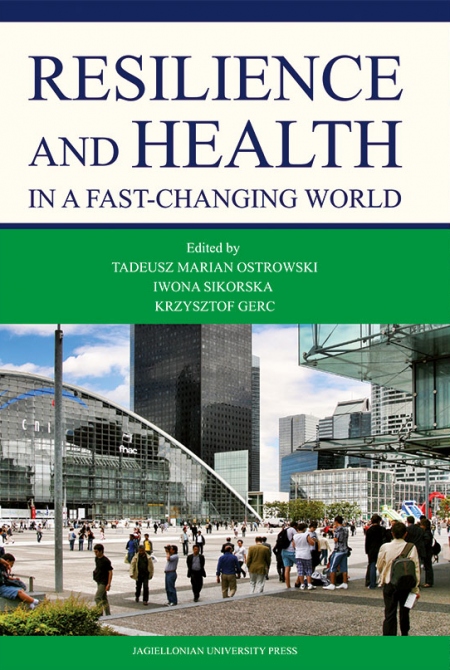Resilience and Health in a Fast-Changing World
Edited by: Tadeusz Marian Ostrowski, Iwona Sikorska, Krzysztof Gerc
Pages: 260
Book format: B5
Publication date: 2015
Release date: 22.02.2016
Book description
What decides whether a person suffering misfortune bounces back quickly or falls into despair for years? Which processes and mechanisms constitute psychological resilience? Is there a particular, evolutionary-shaped model of human adaptation, which enables a person to maintain mental health in unfavorable and dynamically changing circumstances?
All these questions are addressed by the contributors to the monograph titled Resilience and Health in a Fast-Changing World. While searching for the answers the authors refer to an extensive scholarly literature, their own theoretical investigations as well as to the outcomes of empirical researches conducted.
"The monograph raises an important and timely issue of human psychological resilience. The latter is especially important in a fast-changing world presenting an increasing number of challenges and threats, which demand the skills of dealing with them and adapting to changing circumstances...
The volume is addressed to a vast audience of those interested in the problems of health and stress, but first of all to psychologists, both scholars and practitioners. Additionally, it can be a valuable source of information for educators, sociologists, philosophers, physicians and other health professionals."
Tadeusz Marian Ostrowski, Ph.D., Associate Professor at the Jagiellonian University in Cracow, Poland, the Head of the Developmental and Health Psychology Department of this University's Institute of Applied Psychology, a 2nd degree of specialization in adults clinical psychology holder.
Iwona Sikorska, Ph.D., Assistant Professor at the Institute of Applied Psychology, Jagiellonian University in Cracow, Poland.
Krzysztof Gerc, Ph.D., Assistant Professor at the Developmental and Health Psychology Department, Institute of Applied Psychology, Jagiellonian University in Cracow, Poland.
All these questions are addressed by the contributors to the monograph titled Resilience and Health in a Fast-Changing World. While searching for the answers the authors refer to an extensive scholarly literature, their own theoretical investigations as well as to the outcomes of empirical researches conducted.
"The monograph raises an important and timely issue of human psychological resilience. The latter is especially important in a fast-changing world presenting an increasing number of challenges and threats, which demand the skills of dealing with them and adapting to changing circumstances...
The volume is addressed to a vast audience of those interested in the problems of health and stress, but first of all to psychologists, both scholars and practitioners. Additionally, it can be a valuable source of information for educators, sociologists, philosophers, physicians and other health professionals."
From the review by Prof. Nina Ogińska-Bulik
Tadeusz Marian Ostrowski, Ph.D., Associate Professor at the Jagiellonian University in Cracow, Poland, the Head of the Developmental and Health Psychology Department of this University's Institute of Applied Psychology, a 2nd degree of specialization in adults clinical psychology holder.
Iwona Sikorska, Ph.D., Assistant Professor at the Institute of Applied Psychology, Jagiellonian University in Cracow, Poland.
Krzysztof Gerc, Ph.D., Assistant Professor at the Developmental and Health Psychology Department, Institute of Applied Psychology, Jagiellonian University in Cracow, Poland.
Edited by
Tadeusz Marian Ostrowski
, Iwona Sikorska
, Krzysztof Gerc
RECOMMENDED BOOKS
NEW BOOKS

Resilience and Health in a Fast-Changing World
TABLE OF CONTENTS
TABLE OF CONTENTS
Tadeusz M. Ostrowski, Iwona Sikorska, Krzysztof Gerc Resilience from a Variety of Theoretical Perspectives: an Introduction 7
I. RESILIENCE IN THE PHILOSOPHICAL AND THE EXISTENTIAL CONTEXTS
Tadeusz M. Ostrowski
Resiliency and the Meaning of Life 19
Christopher Gill
Building Resilience Today: How Can Ancient Stoicism Help 33
Konrad Banicki
Stoicism at War: from Epictetus and Marcus Aurelius to James Stockdale 47
II. SOCIAL CONTEXTS OF RESILIENCE
Bożena Gulla, Kinga Tucholska
Tough, Resistant, Hard: Resilience and Criminality 61
Monika Wasilewska, Małgorzata Kuleta
Parentification and Psychological Resilience – the Example of Maturity Levels of Defense Mechanisms 73
Przemysław Piotrowski, Stefan Florek
Science of Art in Prison 93
III. PROMOTING OF RESILIENCE AND ASSISTED RESILIENCE
Michelle Jayman, Madeleine Ohl, Bronach Hughes, Pauline Fox
Improving the Socio-Emotional Health of Young People in Early Secondary Education: Preliminary Findings from a Study of the Pyramid Intervention Project 109
Iwona Sikorska, Marta Paluch
Brave Children: How to Develop Resilience in Childhood. 121
Alicja Ryczkowska
Using Music to Stress Reduction . 141
Lidia Baran, Magdalena Hyla
Mental Health in Acceptance and Commitment Therapy (ACT) 153
Arleta Michalik
The Crisis of Adolescence in the Context of Resilience – Positive Prevention 167
IV. THREATS TO MENTAL HEALTH
Krzysztof Gerc, Marta Jurek
Intrapsychic and Sociodemographic Correlates of the Quality of Life in Mothers of Children with Motoric Disability of Neurologic Etiology 181
Beata Mańkowska
Types of Personality, Styles of Coping with Stress and Professional Burnout among Social Workers. 205
Aleksandra Kroll
Communication Disorders as a Threat for Mental Health of Patients with Brain Damage and Their Immediate Environment 221
Krzysztof Gąsior, Jan Chodkiewicz, Wojciech Cechowski
Resilience Measure Questionnaire (KOP-26). Construction and Characteristic of Psychological Instrument 239
List of Authors 253
Tadeusz M. Ostrowski, Iwona Sikorska, Krzysztof Gerc Resilience from a Variety of Theoretical Perspectives: an Introduction 7
I. RESILIENCE IN THE PHILOSOPHICAL AND THE EXISTENTIAL CONTEXTS
Tadeusz M. Ostrowski
Resiliency and the Meaning of Life 19
Christopher Gill
Building Resilience Today: How Can Ancient Stoicism Help 33
Konrad Banicki
Stoicism at War: from Epictetus and Marcus Aurelius to James Stockdale 47
II. SOCIAL CONTEXTS OF RESILIENCE
Bożena Gulla, Kinga Tucholska
Tough, Resistant, Hard: Resilience and Criminality 61
Monika Wasilewska, Małgorzata Kuleta
Parentification and Psychological Resilience – the Example of Maturity Levels of Defense Mechanisms 73
Przemysław Piotrowski, Stefan Florek
Science of Art in Prison 93
III. PROMOTING OF RESILIENCE AND ASSISTED RESILIENCE
Michelle Jayman, Madeleine Ohl, Bronach Hughes, Pauline Fox
Improving the Socio-Emotional Health of Young People in Early Secondary Education: Preliminary Findings from a Study of the Pyramid Intervention Project 109
Iwona Sikorska, Marta Paluch
Brave Children: How to Develop Resilience in Childhood. 121
Alicja Ryczkowska
Using Music to Stress Reduction . 141
Lidia Baran, Magdalena Hyla
Mental Health in Acceptance and Commitment Therapy (ACT) 153
Arleta Michalik
The Crisis of Adolescence in the Context of Resilience – Positive Prevention 167
IV. THREATS TO MENTAL HEALTH
Krzysztof Gerc, Marta Jurek
Intrapsychic and Sociodemographic Correlates of the Quality of Life in Mothers of Children with Motoric Disability of Neurologic Etiology 181
Beata Mańkowska
Types of Personality, Styles of Coping with Stress and Professional Burnout among Social Workers. 205
Aleksandra Kroll
Communication Disorders as a Threat for Mental Health of Patients with Brain Damage and Their Immediate Environment 221
Krzysztof Gąsior, Jan Chodkiewicz, Wojciech Cechowski
Resilience Measure Questionnaire (KOP-26). Construction and Characteristic of Psychological Instrument 239
List of Authors 253
Resilience and Health in a Fast-Changing World
TABLE OF CONTENTS
TABLE OF CONTENTS
Tadeusz M. Ostrowski, Iwona Sikorska, Krzysztof Gerc Resilience from a Variety of Theoretical Perspectives: an Introduction 7
I. RESILIENCE IN THE PHILOSOPHICAL AND THE EXISTENTIAL CONTEXTS
Tadeusz M. Ostrowski
Resiliency and the Meaning of Life 19
Christopher Gill
Building Resilience Today: How Can Ancient Stoicism Help 33
Konrad Banicki
Stoicism at War: from Epictetus and Marcus Aurelius to James Stockdale 47
II. SOCIAL CONTEXTS OF RESILIENCE
Bożena Gulla, Kinga Tucholska
Tough, Resistant, Hard: Resilience and Criminality 61
Monika Wasilewska, Małgorzata Kuleta
Parentification and Psychological Resilience – the Example of Maturity Levels of Defense Mechanisms 73
Przemysław Piotrowski, Stefan Florek
Science of Art in Prison 93
III. PROMOTING OF RESILIENCE AND ASSISTED RESILIENCE
Michelle Jayman, Madeleine Ohl, Bronach Hughes, Pauline Fox
Improving the Socio-Emotional Health of Young People in Early Secondary Education: Preliminary Findings from a Study of the Pyramid Intervention Project 109
Iwona Sikorska, Marta Paluch
Brave Children: How to Develop Resilience in Childhood. 121
Alicja Ryczkowska
Using Music to Stress Reduction . 141
Lidia Baran, Magdalena Hyla
Mental Health in Acceptance and Commitment Therapy (ACT) 153
Arleta Michalik
The Crisis of Adolescence in the Context of Resilience – Positive Prevention 167
IV. THREATS TO MENTAL HEALTH
Krzysztof Gerc, Marta Jurek
Intrapsychic and Sociodemographic Correlates of the Quality of Life in Mothers of Children with Motoric Disability of Neurologic Etiology 181
Beata Mańkowska
Types of Personality, Styles of Coping with Stress and Professional Burnout among Social Workers. 205
Aleksandra Kroll
Communication Disorders as a Threat for Mental Health of Patients with Brain Damage and Their Immediate Environment 221
Krzysztof Gąsior, Jan Chodkiewicz, Wojciech Cechowski
Resilience Measure Questionnaire (KOP-26). Construction and Characteristic of Psychological Instrument 239
List of Authors 253
Tadeusz M. Ostrowski, Iwona Sikorska, Krzysztof Gerc Resilience from a Variety of Theoretical Perspectives: an Introduction 7
I. RESILIENCE IN THE PHILOSOPHICAL AND THE EXISTENTIAL CONTEXTS
Tadeusz M. Ostrowski
Resiliency and the Meaning of Life 19
Christopher Gill
Building Resilience Today: How Can Ancient Stoicism Help 33
Konrad Banicki
Stoicism at War: from Epictetus and Marcus Aurelius to James Stockdale 47
II. SOCIAL CONTEXTS OF RESILIENCE
Bożena Gulla, Kinga Tucholska
Tough, Resistant, Hard: Resilience and Criminality 61
Monika Wasilewska, Małgorzata Kuleta
Parentification and Psychological Resilience – the Example of Maturity Levels of Defense Mechanisms 73
Przemysław Piotrowski, Stefan Florek
Science of Art in Prison 93
III. PROMOTING OF RESILIENCE AND ASSISTED RESILIENCE
Michelle Jayman, Madeleine Ohl, Bronach Hughes, Pauline Fox
Improving the Socio-Emotional Health of Young People in Early Secondary Education: Preliminary Findings from a Study of the Pyramid Intervention Project 109
Iwona Sikorska, Marta Paluch
Brave Children: How to Develop Resilience in Childhood. 121
Alicja Ryczkowska
Using Music to Stress Reduction . 141
Lidia Baran, Magdalena Hyla
Mental Health in Acceptance and Commitment Therapy (ACT) 153
Arleta Michalik
The Crisis of Adolescence in the Context of Resilience – Positive Prevention 167
IV. THREATS TO MENTAL HEALTH
Krzysztof Gerc, Marta Jurek
Intrapsychic and Sociodemographic Correlates of the Quality of Life in Mothers of Children with Motoric Disability of Neurologic Etiology 181
Beata Mańkowska
Types of Personality, Styles of Coping with Stress and Professional Burnout among Social Workers. 205
Aleksandra Kroll
Communication Disorders as a Threat for Mental Health of Patients with Brain Damage and Their Immediate Environment 221
Krzysztof Gąsior, Jan Chodkiewicz, Wojciech Cechowski
Resilience Measure Questionnaire (KOP-26). Construction and Characteristic of Psychological Instrument 239
List of Authors 253
Choose chapters to buy:
Order value:
0.00 zł























